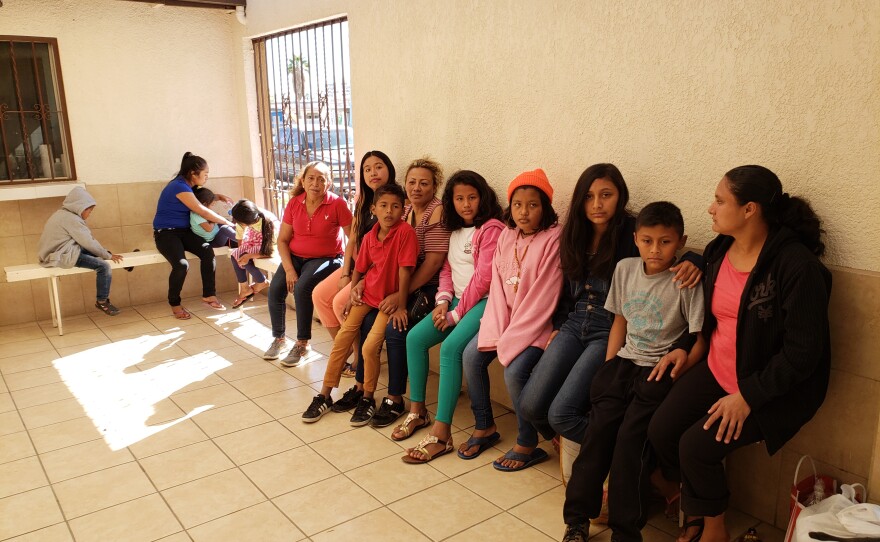The number of migrant families trying to cross the border has increased in San Luis Rio Colorado, Mexico. On both sides of the border, officials and advocates are straining to keep up as border security negotiations continue.
(Editor's Note: To hear the audio from this report, visit https://www.npr.org/2019/02/13/694463685/in-ariz-surge-of-migrant-families-trying-to-cross-into-u-s-strains-resources )
MARY LOUISE KELLY, HOST:
All right, as Washington tries to finalize this deal over border security, we're going to get a closer look at what is needed on the border. In the Yuma sector, the number of migrant families crossing the border more than doubled last year. And, as NPR's Joel Rose reports, that is straining resources in the U.S. and in Mexico.
JOEL ROSE, BYLINE: We're flying high above the border fence separating Yuma County, from Mexico. Barbie Moorhouse is at the controls of a Border Patrol helicopter.
BARBIE MOORHOUSE: The systems are all green, and the lights are all on. We're good to go.
ROSE: Before she was a pilot, Moorhouse worked on the ground as a Border Patrol agent in the mid-2000s. Back then, Moorhouse says agents ran themselves ragged chasing migrants trying to cross illegally.
MOORHOUSE: It was just, to me, like the wild, Wild West. It was just out of control. We did the best we could with what we had at the time.
ROSE: Since then, the Border Patrol ranks have swelled. More miles of wall have been built, and the number of illegal border crossings has fallen to just a fraction of what it was a decade ago. But today, the face of those migrants has changed. Instead of farm workers and laborers trying to dodge agents, nearly 90 percent of the border crossers are families, many fleeing violence and poverty in Central America. They're trying to get caught to present themselves to agents and ask for asylum. And once again, the U.S. is not prepared.
ANTHONY PORVAZNIK: It is a crisis for us because this is a situation that the Border Patrol is not resourced or geared to deal with.
ROSE: Anthony Porvaznik is the chief patrol agent in Yuma. He says the number of migrant families crossing in his sector is on pace to double again this year. Porvaznik says his agents are spending hours caring for the migrants in their custody, picking up hundreds of hamburgers at a time from McDonald's and waiting with them at the hospital if they need medical attention.
PORVAZNIK: We need additional manpower to deal with the population that we have to essentially babysit, and that takes Border Patrol agents away from a national security, border security mission to deal with a humanitarian mission.
ROSE: The White House has asked for $800 million in humanitarian aid for the border and for more agents. Congress is still trying to hammer out the details, including funding for more border wall though far less than what the president wanted. But none of that is likely to stop these migrant families. And it's not just the Border Patrol that is scrambling to adjust. About half a mile south of the border in a town called San Luis Rio Colorado, Martin Salgado runs a small migrant shelter.
MARTIN SALGADO: This house was made originally for men.
ROSE: Salgado says it was primarily a weigh station for migrant men trying to get to the U.S. to work. But now Salgado says the majority of migrants are women and children seeking asylum.
SALGADO: From a year ago, there's a lot of women - a lot, a lot of women and a lot of children. But in the past, you don't see this picture.
ROSE: I mean, it sounds like a schoolyard out there.
SALGADO: Right.
ROSE: Yeah.
SALGADO: Right.
ROSE: Before, this was a place to bunk for a night or two. But now few migrant families are sleeping here. That's because they're afraid to lose their place in line for a chance to apply for asylum at the port of entry. That line has grown longer in recent months as U.S. officials limit applications to just a few families a day. Migrant families return to the shelter just to eat, shower and wash their clothes.
ROSIA RAMIREZ PANULOZA: (Through interpreter) These are good people. My own village - I cannot imagine anyone being as helpful and giving.
ROSE: Rosia Ramirez Panuloza left Guerrero in southern Mexico with her three children. She has two daughters - the youngest 10 months old and a son who's 11. Ramirez says gang members in their hometown tried to recruit him.
RAMIREZ: (Through interpreter) They would tell him that if he doesn't join them, they're going to hurt us, hurt his little sister and us.
ROSE: Ramirez and her children spend their nights sleeping under a blue tarp fastened directly to the metal border wall along with hundreds of other migrant families. I asked the mayor of San Luis Rio Colorado if this is a crisis. He said no. Like the other people I met here, he says they'll make do.









